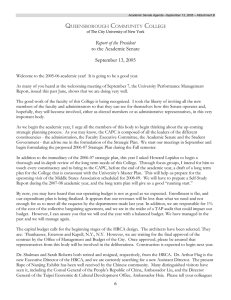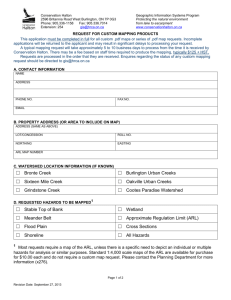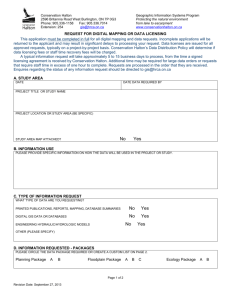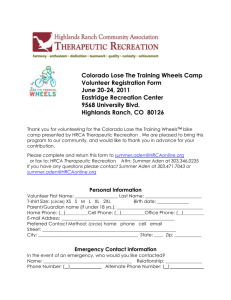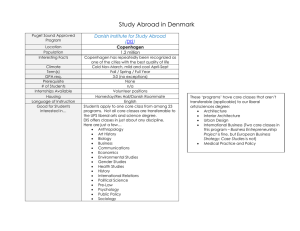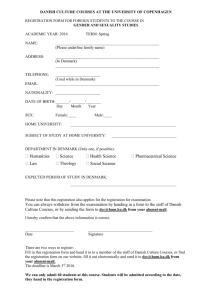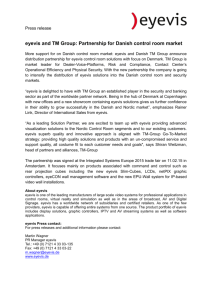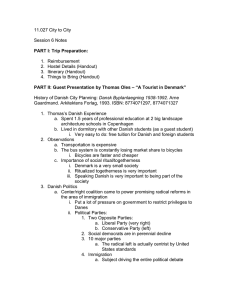jodi hebert-eng
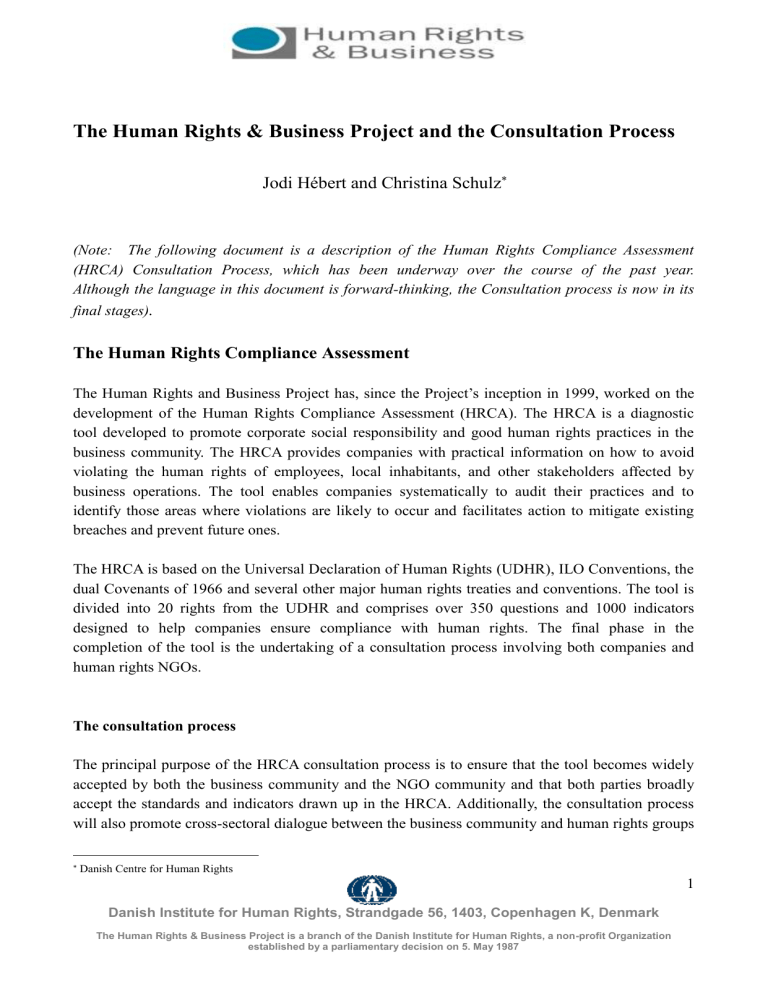
The Human Rights & Business Project and the Consultation Process
Jodi Hébert and Christina Schulz
(Note: The following document is a description of the Human Rights Compliance Assessment
(HRCA) Consultation Process, which has been underway over the course of the past year.
Although the language in this document is forward-thinking, the Consultation process is now in its final stages) .
The Human Rights Compliance Assessment
The Human Rights and Business Project has, since the Project’s inception in 1999, worked on the development of the Human Rights Compliance Assessment (HRCA). The HRCA is a diagnostic tool developed to promote corporate social responsibility and good human rights practices in the business community. The HRCA provides companies with practical information on how to avoid violating the human rights of employees, local inhabitants, and other stakeholders affected by business operations. The tool enables companies systematically to audit their practices and to identify those areas where violations are likely to occur and facilitates action to mitigate existing breaches and prevent future ones.
The HRCA is based on the Universal Declaration of Human Rights (UDHR), ILO Conventions, the dual Covenants of 1966 and several other major human rights treaties and conventions. The tool is divided into 20 rights from the UDHR and comprises over 350 questions and 1000 indicators designed to help companies ensure compliance with human rights. The final phase in the completion of the tool is the undertaking of a consultation process involving both companies and human rights NGOs.
The consultation process
The principal purpose of the HRCA consultation process is to ensure that the tool becomes widely accepted by both the business community and the NGO community and that both parties broadly accept the standards and indicators drawn up in the HRCA. Additionally, the consultation process will also promote cross-sectoral dialogue between the business community and human rights groups
Danish Centre for Human Rights
1
Danish Institute for Human Rights, Strandgade 56, 1403, Copenhagen K, Denmark
The Human Rights & Business Project is a branch of the Danish Institute for Human Rights, a non-profit Organization established by a parliamentary decision on 5. May 1987
at a transnational level. The procedure for the consultation process involves the distribution of the
20 rights from the HRCA among participants from the business and NGO community in a wide range of European countries. More than 30 ‘Review-teams’ comprising a company and a human rights / CSR organisation will be allocated 1 or 2 rights from the HRCA, which they will review individually. Subsequent to the individual reviewing, the two parties will meet and discuss their comments and any potential areas of disagreement. The purpose of establishing these teams is to create a balance between different interests: While companies ensure that economic and political limitations are given due consideration, the human rights representative ensure sure that community interests potentially affected by company practices are given due attention.
The participants are allocated a section from the HRCA that contains the following components.
1) A short list of general guidelines for compliance with the right. These guidelines form the basis of the specific questions and indicators in the checklist.
2) A checklist for compliance with the right. The checklist consists of detailed sub-questions each supported by a paragraph of explanation. A list ‘suggested indicators’ is provided to help guide the user in determining whether or not the company is in compliance.
3) A short description of the right in plain language so that users and readers with a non-legal and non-human rights background can understand the basic features and the principles enshrined in the right. A final section that provides a list of international instruments including international treaties, conventions and declarations containing provisions on the right follows the description.
These sources have been used as the basis for all the guidelines and checklist questions in the
HRCA.
When reading and examining the rights, the participants are asked to make a general review of the information provided, focusing in particular on the following:
Are the guidelines in the first component straightforward, concise and comprehensible?
Are the questions and the indictors in the second component reasonable and relevant i.e.: i) Do they cover the right areas sufficiently? ii) Are the indicators or ‘areas for investigation’ reasonable, clear and straightforward? Additionally, which questions and indicators should be marked as ‘key’, to be included in a shortened version of the HRCA? And which questions and indicators should companies pass along to their suppliers, contractors and other business partners?
Is the description of the right in the third component clear and comprehensible?
The allocated right will be designed as a website and the participants will be able to make their comments and notes on-line. Only your partner and the Human Rights & Business Project will have access to this site. Each right consists of approximately 20-30 pages and the participants are
2
Danish Institute for Human Rights, Strandgade 56, 1403, Copenhagen K, Denmark
The Human Rights & Business Project is a branch of the Danish Institute for Human Rights, a non-profit Organization established by a parliamentary decision on 5. May 1987
expected to invest 2-3 hours of reviewing prior to the meeting. The participants should first review the information individually by marking any areas where they would suggest changes to be considered.
Subsequent to the individual review, a meeting will be scheduled where the participants will meet with the opposite team member. The purpose of this meeting is to discuss the comments of all participants and to issues of agreement and disagreement for amendments. A representative from the
Human Rights & Business Project will be present at this meeting in order to receive the feedback; to assist in the dialogue; record all of the suggested changes; and answer any questions the participants might have. Although taking part in the discussion, the Human Rights & Business
Project representatives’ role will not be to influence the input in any way. During this meeting, provided there is agreement, the team can decide on direct amendments to the HRCA database including the addition or deletion of questions and indicators.
When all the consultation meetings are concluded and the feedback has been substantiated from the participating companies and NGOs, two major follow up events will take place. The first will be a specialist committee meeting held in Copenhagen where the most controversial areas and the major issues of disagreement that have been presented during the consultation process will be discussed.
The Human Rights & Business Committee is composed of 5 representatives from human rights groups and 5 representatives from business groups. The committee members are jointly selected and led by the directors of the Danish Industrialization Fund for Developing Countries and the Danish
Institute for Human Rights. After first discussing each suggested change to the HRCA database, the committee decides whether the suggested changes should be made or not. Amendments will be incorporated into the HRCA database.
The second event is a three-day conference in Copenhagen where a number of Development
Finance Institutions will meet to discuss the HRCA. This group will review the ‘quick check’ version of the HRCA, which make up approximately 10 % of the HRCA. Representatives from the
Human Rights and Business Project will also be present at this meeting to collect the feedback and serve as facilitators.
After completion of the consultation process, the HRCA will be edited and the information in the will be transformed into a computer program and made available on the web for companies and other interested users. We are currently in the process of designing the program and more specific details on the computer program.
The HRCA tool is the first of its kind addressing human rights and business responsibility in a clear operational manner, and is therefore a unique and practical tool, which companies can apply to
Danish Institute for Human Rights, Strandgade 56, 1403, Copenhagen K, Denmark
The Human Rights & Business Project is a branch of the Danish Institute for Human Rights, a non-profit Organization established by a parliamentary decision on 5. May 1987
3
improve corporate social responsibility. This has been reflected in the process used in developing the HRCA over the past 4 years. 10 Danish companies have been involved in the process, and Shell
International has been used as the test company in order to ensure that the tool was practical and could be rapidly integrated into a business setting. The tool was pilot tested in Shell South Africa
(2001) and Shell Oman (2002), the results of which can be found in Shell's annual report (2001 and
2002).
The Human Rights Compliance Assessment comprises the following rights:
Right to life
Freedom of movement
Right to adequate health
Right to liberty and security
Freedom of opinion,
Right to adequate housing of person expression, thought and
Freedom from forced labour religion
Right to take part in
Right to adequate food and servitude government
Freedom from torture or
Right to peaceful assembly
Right to education degrading treatment or and freedom of association punishment
Right to a fair trial
Right to family life
Right to cultural life participate in
Right to privacy
Right to own property
Right to work an just and
Right to adequate standard favourable conditions at of living work
Right to intellectual property
Danish Institute for Human Rights, Strandgade 56, 1403, Copenhagen K, Denmark
The Human Rights & Business Project is a branch of the Danish Institute for Human Rights, a non-profit Organization established by a parliamentary decision on 5. May 1987
4
